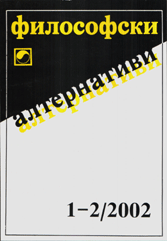Хесе и Уайлд — едно разсъждение върху „философията на мига", основано на естетическия стадий на живот на Киркегор
Hesse and Wilde — Reasoning on "The Philosophy of Instant", Based on the Aesthetical Stage of Kierkegaard's Life
Author(s): Ralitsa SapundzhievaSubject(s): Philosophy
Published by: Институт по философия и социология при БАН
Summary/Abstract: Hesse and Wilde — a reflection over the "philosophy of pleasure", based on the aesthetical stage of life in the philosophy of Soren Kierkegaard Ralitsa Sapoundzhieva — a doctoral student, Philosophical Faculty, Sofia University The aesthetical way of life in the philosophy of Soren Kierkegaard is a complete form of existence of the human being at a definite stage of his life. Of course, this period can be the whole human life. An aesthete's life is based on a "dogma" of the changeable moment, "flash", the concrete situation and its peculiarities and he uses them always. An aesthete in crisis, an aesthete on the doorstep of the ethical stage of life, an aesthete who cannot make a step forward is described at the philosophical novel "The Steppe Wolf of the German writer Hermann Hesse. Similarly to the vision of Kierkegaard, Hesse considers the aesthetical way of life as a reflection, reflection which leads only towards despair, reflection which cannot overbear the immediacy which is a limitation and "death" of it. Over the problem of the personal choice, which life makes instead of man in the aesthetical stage of life considers the English writer Oscar Wilde in his novel "The Picture of Dorian Gray". All the characters in the novel are aesthetes and all of them become preys of their view of life. In all these philosophical views the idea of ethical way of life is unreal, impossible. The "philosophy of pleasure" is strong in its vanity, egoism, arrogance and cruelty. The only opportunity for choice is the choice of self—destruction. This is the fate of the aesthete who is lost at his changeable moods. But on the other side this show the only direction for the survival of the human being — the choice of life which is equivalent of the choice of the ethical way of life.
Journal: Философски алтернативи
- Issue Year: XI/2002
- Issue No: 1-2
- Page Range: 40-49
- Page Count: 9
- Language: Bulgarian
- Content File-PDF

